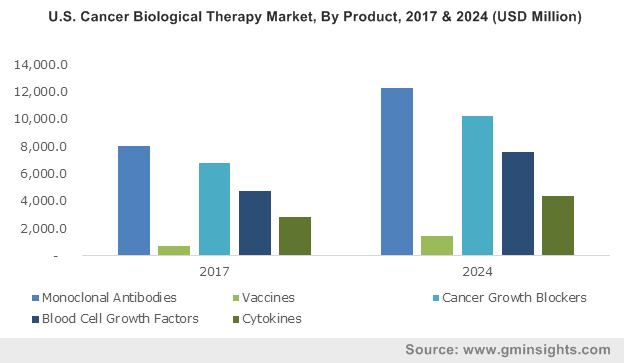Cancer Biological Therapy Market – Global Industry Analysis Report, Share, Size, Growth, Price Trends and Forecast, 2016 – 2023
Publisher : Fractovia | Published Date : 2016-08-08Request Sample
Industry Trends
Global Cancer Biological Therapy Market size contribution was $61.4 billion for 2015 with overall revenue predicted to surpass $101 billion during forecast period with CAGR of more than 6.1%. Increase in proportion of different kinds of cancers and rising acceptance of biological treatment is predicted to drive global cancer biological therapy industry trends.
As per WHO reports, proportion of new cases of cancer are expected to increase by 70.1% in future and the reason for this being enhanced consumption of alcohol and tobacco. Increase in aging population all across the globe is projected to fuel global biological cancer therapy industry due to correlation between aging and new cases. Further, old people are more vulnerable to cancer ailment and this key aspect is predicted to boost industry demand.
U.S. Cancer Biological Therapy Market size, by product, 2012 – 2023 (USD Million)

High treatment cost of cancer therapy is mainly owing to high price of medicines. Lot of expenditure is incurred on recognizing and designing a medicine, acquiring preclinical information and clinical trials. It is also forecast that each medicine costs more than $1.2 billion. Drug monopoly is yet another factor adding to high medicine price. Further, there are less proportion of firms involved in drug production resulting in less competition and higher costs. All these factors can inhibit the growth of global cancer biologic therapy market trend.
Download a sample copy of this report: https://www.gminsights.com/request-sample/detail/676
Product Trends
Global cancer biological therapy industry was segmented into products like cytokines, monoclonal antibodies, blood cell growth factors, monoclonal antibodies and vaccines. Monoclonal antibodies segment contributed more than $21.1 billion for 2015. Antibody treatment is the most significant and successful approach used for treating solid burns as well as hematological malignance. This is one of the reason for the segment growth.
This segment is sub -segmented into bi-specific monoclonal antibodies, naked monoclonal antibodies and conjugated monoclonal antibodies. Bi-specific monoclonal antibodies sub-segment is predicted to register CAGR of 6.51% during forecast timeline.
Vaccines segment is projected to record CAGR of about 17.3% during forecast timeline. Preventive vaccines for HPV (Human papillomavirus) and HBV (Hepatitis B Virus) can encourage antibody production that binds to microbes and block their ability to proliferate & cause infection. This segment is sub-segmented into preventive and therapeutic types.
Cancer growth blockers segment size was more than $18.1 billion for 2015 and is predicted to register CAGR of 5.9% during forecast timeframe. This segment is sub-segmented into mTOR inhibitors, tyrosine kinase inhibitors and proteasome inhibitors. Tyrosine kinase inhibitors sub-segment led the overall revenue for 2015 and is projected to grow in future. Blood cell growth factors segment is predicted to register CAGR of 6.3%. The segment is driven by bone marrow cells and blood cells stimulation applications. It is sub-segmented into filgrastim and lenograstim.
Regional Trends
Global cancer biological therapy market is segmented into geographical locations like APAC, North America, MEA, Europe and LATAM. Enhanced public expenditure on research & development activities and government support for North American industry is predicted to drive its growth during forecast timeline.
Germany cancer biological therapy market contributed more than $4.4 billion for 2015 and is predicted to maintain its revenue share domination owing to rising occurrence and favorable compensation & insurance policies. All these aspects are predicted to propel the growth of European industry.
Japan cancer biologic therapy market share contributed for more than 40.1% of overall revenue share of APAC for 2015 owing to its rising old age population. China’s strong intellectual property rights and compensation policies have encouraged industry players to invest in the research & development activities and enhance growth of new biologic molecules. Growing focus of government on enhancing production capabilities through large scale funding along with promotion of academic-industry partnership is predicted to stimulate regional industry growth. Brazil is predicted to experience 7.41% expansion due to growing cases of different kinds of cancers witnessed in the region and this will promote the LATAM industry growth.
Competitive Trends
Key industry participants profiled in the report include AstraZeneca Plc, Incyte, Eisai, Merck & Company Incorporation, Novartis International Ag, Bristol-Myers Squibb, Spectrum Pharmaceuticals Incorporation, Bayer, F. Hoffmann-La Roche AG, Amgen Incorporation, Otsuka, GlaxoSmithKline Plc, Eli Lilly & Company, Celgene Corporation, Sanofi, Pfizer, Abbvie and Seattle Genetics Incorporation.